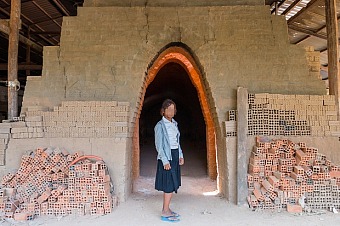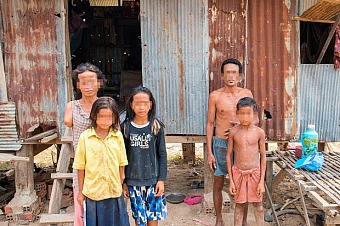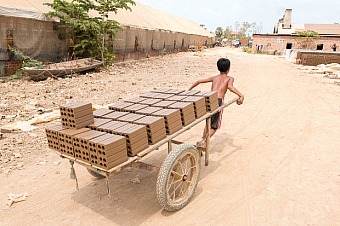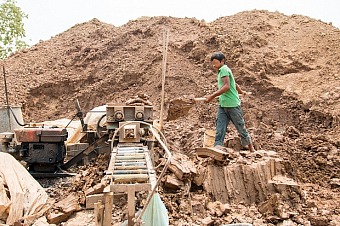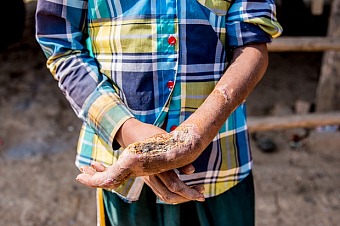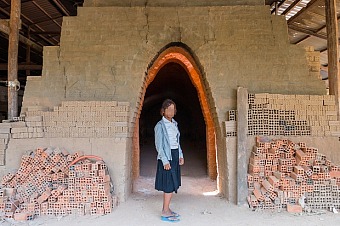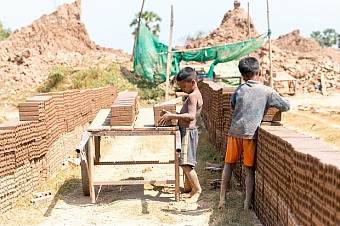World Day Against Child Labour: The Plight of Child Labourers in Cambodian Brick Factories
Published on 12 June 2015To commemorate June 12 World Day Against Child Labour (WDACL) 2015, LICADHO is publishing personal testimonies of five children and one adult who work in Cambodian brick factories in Or Raing Ov district, Tbong Khmum province and Preah Prosob village, Kandal province. These testimonies provide a glimpse into brick factory child labour, which is considered to be one of the worst forms of child labour, and demonstrate the negative effects of brick factory child labour on children. One adult testimony has been included to give context to the children’s stories, and to illustrate some of the underlying causes of child labour in brick factories.
Children work at brick factories where their parents are also labourers. Typically, the parents begin working at the factories because they are indebted to the factory owners. Often these debts arise because of sickness or injury.
Panha, 37-year-old male brick factory worker
I have been working in brick factories for more than 20 years, because I neither had a house nor land in my hometown. I didn’t know what to do.
I started to work in a brick factory after I borrowed money from the owner to cover the medical bills of my child. The loan eventually grew to $1,200 after I borrowed more to pay for daily expenses. I worked for 18 years in that brick factory.
Three years ago, I moved to my current brick factory and asked the owner to pay the $1,200 I owed to the owner of the last brick factory. I had to give my thumbprint to get the new loan.
The previous factory owner used to call the police whenever we wanted to leave, so I couldn’t speak out. They multiplied the loans whenever they wanted.
I make about $12.50 per day. I don’t have a work contract. If I work here for three years, the owner will not multiply the loan. The current owner is kind. When any one of us gets sick, he takes us to the hospital even at night. The owner covers the expenses for water, housing and electricity.
Here, I dig the clay, transport bricks, and help to repair the machines. I spend around 30,000 Riel ($7.50) for the children and for food every day. My children help me with the work after school such as taking the bricks out of the oven, and transporting them on carts. They help me only when they are available. I don’t force them to work. I ask them to help them because there are many trucks that need to be filled with bricks.
Since we began working here, none of our family members have been injured. We never allow our children to stay near the machines.
I have heard about child labour. I understand that children under 18 are not allowed to work according to the law. I don’t want my children to help with the work, but I need help to speed up the work to make enough bricks to meet the quotas.
I don’t have any plan for my children’s future but I want them to go to school so that they do not rely on me, as I do not have anything. I am fed up with this work after more than 20 years. I am tired, so I don’t want my children to have the same difficulties. I ask my children to study hard. The only way they will stop working at the brick factory is if they go to school, obtain knowledge and find a good job.
When I pay back the loan to this factory owner, our family will stop living in the brick factory.
Children are involved at every stage of the brick making process, including: digging clay from the ground, feeding the clay into small and large brick-making machines, transporting bricks on small wooden carts called ramor or with tractors, laying out the clay bricks to dry in the sun, transporting sun-dried bricks to the oven, chopping firewood for the ovens, sealing the ovens with wet mud, and loading the cooked bricks onto trucks.
Naveth, 15-year-old male brick factory child labourer
I start working at the brick factory at 7:00 am. I work until 10:00 am. I take a break at lunch and start working again 1:00 pm until 5:00 pm.
I dropped out of school in grade 6 because my parents asked me to tend the cows belonging to my grandfather. Afterward, I moved to work in the brick factory where my parents live. I do not want to go to school because I am shy.
At the brick factory, I dig up clay, chop up wood for the kilns, seal the kilns with wet mud, and fill the brick-making machine with diesel. I help my parents because we are poor and need to earn money. The hardest part of the work is sealing the kiln with wet mud.
In my free time, I take naps or call my relatives on the phone.
All of the children interviewed were aware of the particularly hazardous working conditions in brick factories. These conditions include the sun and heat, long hours of work, having to wake up early, using dangerous machinery, carrying heavy loads, and sealing ovens.
Sovann, 15-year-old male brick factory child labourer
I wake up at 6:00am to start working. My job is to transport bricks to dry on tarps in the sun. I also dig up the clay, put clay into the brick-making machine, and load the bricks onto waiting trucks. I earn 1,500 Riel ($0.40) if I dry bricks on tarps. I work because my family needs to pay off debt.
In the past, there was a machine to mix the clay. But now, there is no machine, so it is more difficult to turn the clay into bricks. I work here because my mother borrowed money from people. Because my family lives here, I work here.
I have a little time to enjoy myself. I like to play football to entertain myself. Sometimes, I play games with the other children. I still study at school. I am in grade 5. I ride my bicycle to school everyday, and it takes five minutes if I drive fast. At school, I never learned about child rights or child labour.
When I grow up, I want to work as a construction worker, a metal welder, or make cement pipes. These would be easier than brick factory work, where I risk putting my hand in the machine and injuring it. I also want to work in a bank, or become a doctor, but I would have to study hard.
Despite having ambitions to a better life, many children grow up and continue working in the same factories as their parents, stuck in poverty and in debt to factory owners.
Srey Mom, 14-year-old female brick factory child labourer
I am the third child. I have worked at the brick factory for three years. Sometimes I work, sometimes I don’t. In the morning, I get up and clean the house. At the brick factory, I assist my mother transporting bricks from the machine. The most dangerous part of the job is to put the clay into the brick-making machine. In the previous brick factory where my family lived, there was no brick-making machine.
Working here is easy because I am not forced to work. I work about three hours per day. The manager is kind. In the brick factory, people are kind and rarely have disputes with each other. The older people play cards and gamble for money. The smaller boys go out fishing. I play games with friends and siblings in my free time.
I go to school and study in grade 4. I study from 7:00 am to 11:00 am. I am ranked fifth out of 20 students. I am happy with school. If my mother asks me to stop school, I will say that I have exams to finish. But if my mother asks me to stop, I will study only until grade 7. At school, I was never taught about child rights or child labour.
I would like to be a Khmer literature teacher. But I don’t know what I will do when I grow up. If my parents did not work here, I would be an assistant to a taxi driver.
In most cases, working in brick factories negatively affects the education of children. Several children interviewed by LICADHO do not attend school, having dropped out at some point in the past to work. Others attend school in the morning or the afternoon, and help their parents work a few hours each day.
Oudom, 11-year-old male brick factory child labourer
I have been working in a brick factory since I was five years old. I dig up the clay and put it into the brick-making machine. I also transport clay bricks on wooden carts. I also collect vegetables around the brick factory.
I work because my mother asks me to do it. I want to leave the factory. I don’t want to stay here. I want to leave. The hardest part is waking up at 3:00 am every morning so that I can dig the clay before the sun is too hot.
When I have small cut, I use the grass to stop the bleeding, but I have to chew the grass first. I inform my mother so that she can put something on it to stop the bleeding.
I stopped school in grade 2 because no one was helping my mother. Still, I want to study because I want to read and write. I have heard that children have the right to attend school, and that children are not allowed to work in brick factories because it is dangerous work.
Most of the children interviewed complained about the working conditions in brick factories and express deep frustration at feeling trapped in the brick factory life. Some want desperately to leave, citing construction work, metal welding, repairing fans, being a mechanic, or making cement pipes as preferable alternatives to brick factory work.
Rattana, 13-year-old male brick factory child labourer
I live with my parents in the factory. In my family, there are 6 children. I am the fourth child. I take care of my brothers and sisters. I know that my parents are in debt to the factory owner. We owe the factory owner 5,000,000 Riel ($1,250).
In the brick factory, I load the bricks onto wooden carts and the trucks. The hardest part is that I don’t have a lot of time to play with friends. When I do have free time, I play billiards or kub vong (a shoe-throwing game).
I still go to school. At school, I learned about the main points of child rights. I don’t want to stay in the brick factories. Anything else would be preferable. When I grow up, I want to become a motorbike mechanic.
MP3 format: Listen to audio version in Khmer




